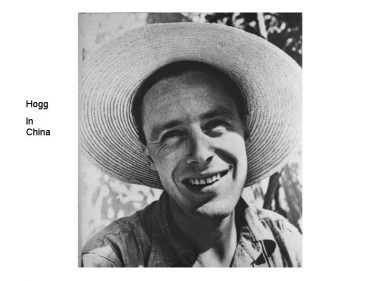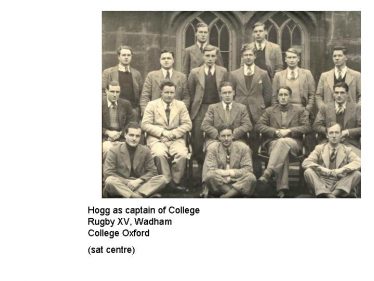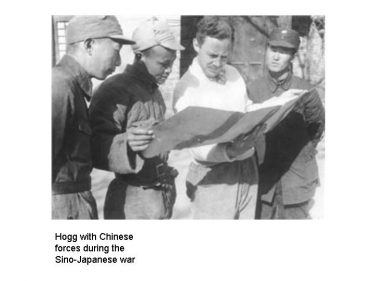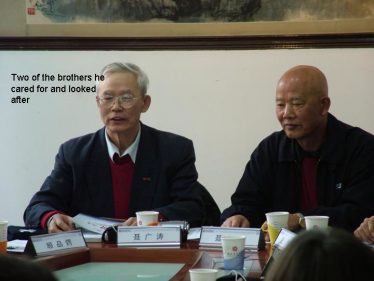
George ‘Aylwin’ Hogg entered St George’s in 1927 and left in 1934. His short and remarkable life has left a profound legacy on the people of China, and also on his school, St George’s.
For those unacquainted with the story, Hogg went up to Wadham College Oxford in ’34 to read ‘Greats’ (PPE), thereby following a family tradition (all of his brothers also attended Wadham). From Oxford, Hogg managed to persuade his parents to finance a travelling expedition across America, and then to Japan and China with his Aunty, the well-known international pacifist campaigner Muriel Lester – today’s ‘Gap Year’. Hogg stayed in touch with St George’s and like many of his friends, he wrote back to The Georgian, the school magazine, updating them of his travels.

George Hogg at Wadham c 1936
Indeed, whilst at Oxford he also played against the School 1st XV in the annual old boys match, was good enough to make the all-star OG’s sevens team (which won the Herts tournament 7 years running in the 1930s), and also played for the inaugural OG cricket team The Dragons.
Hogg’s actions in China as a reporter for the Manchester Guardian, and especially in saving a school in war-torn China from the ravages of the Japanese Army were remarkable. It is an heroic story that ended in tragedy, as Hogg died in Shandan, Gansu Province, in 1945 at the age of 30.

George Hogg with Nie Rongzhen, General in the Chinese Communist Army, on the left c 1943
This story of Hogg is now well known amongst most of the community of St George’s, but this was not always so. Mrs Weatherly, the school Archivist, first delved into the archives in the 1980s following on from articles by James McManus, the Telegraph and later Times journalist. The coming of the film, The Children of Huang Shi and the biography of Hogg Ocean Devil in 2008 acted as a further stimulus for the School’s interest in George Hogg’s life.
A special insight into the History of in China
In 2008 the school sent a group of students and staff to research the life of Hogg further. We travelled up to Gansu province, to the town where he died. We visited memorials, statues and his tomb.

A modern memorial to George Hogg, Shandan, Gansu province
We also interviewed some of his former students whose lives he saved and also the brothers who he adopted. This was edited skilfully by the history students and made into a DVD which is used to teach the students of St Georges during Year 9. The story of Hogg and the question of his significance allows us to study not only St George’s in the 1930s, but also China and the Far East during the Second World War. This unit has widened our teaching of the Second World War and given the students an understanding of the events of the Sino-Japanese War, including the atrocities that occurred to cities like Nanjing. It also gives students a better sense of China as a modern country today – the history of the decline of its imperial monarchy, the failure of its Republic, the period of Civil War and the rise of Communism. Students answer questions on the significance of Hogg*, and examine the accuracy of the film The Children of Huang Shi as an interpretation of his life. They are upset that St George’s does not feature however!

Two of the brothers cared for by George Hogg, 2008
What is most exciting about the history of George Hogg is that so much of it is still living. This was evident from our trip to China in 2008 and also this summer when we welcomed two of Hogg’s surviving adopted sons and also other members of the Hogg family to celebrate his life and legend. During the summer, the school was given the George Hogg private papers by the Hogg family which will go on to enrich our understanding and teaching of Hogg even further. We have much more to learn!
* See also four presentations by pupils in 2011, evaluating the significance of George Hogg in world history, as an indication of how his life and work are studied in St George’s School.

Comments about this page
I am rereading this page with my previous input and found that I did make an big mistake in noting George Aylwin Hogg’s birthday. He was born on Feb 26 and died on July 22, 1945. Tomorrow is July 22, on which he passed away of sickness in Shandan, Gansu, China.
Ed. Apologies for our delay in not publishing this on 22 July!
I have noticed the photo of ‘Hogg with Chinese forces during Sino-Japanese war in 1943’: the caption reads “with Chinese forces” and I think this was in 1939 when George Hogg visited the Communist Army, specially in the war field and met with General Nie. The photo was taken by a well-known photographer, Sha Fei, whose story is also interesting.
I have found notes about this photo, identifying the key figures from left to right, as General Nie Rongzhen, senior communist military leader, whose photo was selected as the cover of ‘Ocean Devil’, James McManus’s biography of George Hogg; the on-site interpreter, Mr. Liu Ke. Liu graduated from Peking University in 1936, joined the Communist Party and army and served as deputy director of the Secretary’s Office of the Commanders’ HQ. After 1949, he was working as Provost of the Beijing Foreign Language Institute. The 4th figure was Deng Tuo, who was also one of the early Communists – a journalist, chief editor of the Frontier newspaper. etc. He came to serve as the director general and editor in chief of the People’s Daily: he was a poet, as well as a writer. He published some very good writing in the 1950s and early 60s. He was denounced because of his writings and died in 1966, just at the beginning of the so called Cultural Revolution in China. What they were reading as shown in the photo was said to be some important document which was seized or captured from the Japanese invaders, maybe maps.
Ed: Peter Chin is undertaking extensive research about George Hogg and the Gung Ho movement. He has found some fine photos of Hogg, taken in 1941 by Carl Mydans, an American war photographer with Life Magazine. These can be found in a Chinese blog: http://blog.sina.com.cn/s/blog_593c5d710101inqz.html – it is worth pasting this into your browser to look at the photos, but the translation is not easy to read.
I live and work in China and have shown ‘Children of the Silk Road’ to many of my students to show them about the kindness of G A Hogg. Of course I have to consider the strong anti-Japanese feelings that still exist across China and especially in Shaanxi where I live. Although he died young at the age of 30, G A Hogg undertook a remarkable journey with the children. Quite a man who never gave up his ideals and the care of his young charges.
Nice writing and great work. Looking forward to more stories on Hogg. I am from Shaanxi, a place George Hogg lived and worked for years. I am an member of ICCIC in China.
Ed: We would love to hear more about the Shaanxi writers, and what ICCIC is now doing.
Peter replied in March 2013: George Hogg was born on July 22 1915 and it will be his 100-year anniversary. Two years from now and people have to do something done one way or the other, in China or in UK.
Last September, I did visit Gansu and attended the celebration there of the 70th anniversary of Bailie School and 115th birthday of Rewi Alley, he was the best friend of George. They have the museum of them and the monument. They also have the collection of over 4000 books and other items contributed to them by Rewi in the 1980s, at the time of the re-establishment of Bailie School in Shandan in 1982. The Bailie School today is still in operation as a government owned vocational school, with the best hope of its growth into a college. (This is what they told me). The Museum is also at their place. They are the right persons and place for the event. And also the family members of George, including his adopted children in China, the Nie’s Brothers.
I hope also to have some contact with David Waters and St George’s School pupils.
How interesting. I never knew much about what people meant by George Hogg, but now I do!
Add a comment about this page